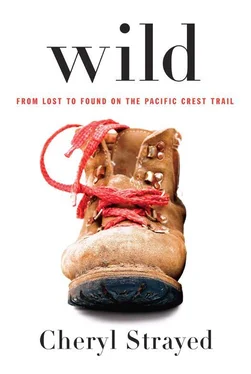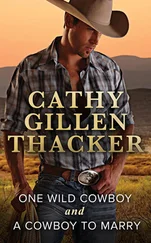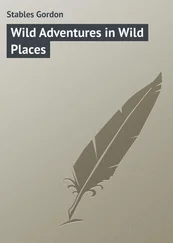Cheryl Strayed - Wild
Здесь есть возможность читать онлайн «Cheryl Strayed - Wild» весь текст электронной книги совершенно бесплатно (целиком полную версию без сокращений). В некоторых случаях можно слушать аудио, скачать через торрент в формате fb2 и присутствует краткое содержание. Год выпуска: 2012, ISBN: 2012, Жанр: Современная проза, на английском языке. Описание произведения, (предисловие) а так же отзывы посетителей доступны на портале библиотеки ЛибКат.
- Название:Wild
- Автор:
- Жанр:
- Год:2012
- ISBN:978-0-307-95765-8
- Рейтинг книги:4 / 5. Голосов: 1
-
Избранное:Добавить в избранное
- Отзывы:
-
Ваша оценка:
- 80
- 1
- 2
- 3
- 4
- 5
Wild: краткое содержание, описание и аннотация
Предлагаем к чтению аннотацию, описание, краткое содержание или предисловие (зависит от того, что написал сам автор книги «Wild»). Если вы не нашли необходимую информацию о книге — напишите в комментариях, мы постараемся отыскать её.
Wild — читать онлайн бесплатно полную книгу (весь текст) целиком
Ниже представлен текст книги, разбитый по страницам. Система сохранения места последней прочитанной страницы, позволяет с удобством читать онлайн бесплатно книгу «Wild», без необходимости каждый раз заново искать на чём Вы остановились. Поставьте закладку, и сможете в любой момент перейти на страницу, на которой закончили чтение.
Интервал:
Закладка:
I was not going to nod. Everything that had ever happened to me in my whole life was mixed into the cement that kept my head perfectly still at the moment an astrologer told me that my father had infected me.
“Wounded?” was all I could manage.
“Yes,” said Pat. “And you’re wounded in the same place. That’s what fathers do if they don’t heal their wounds. They wound their children in the same place.”
“Hmm,” I said, my face blank.
“I could be wrong.” She gazed down at the paper between us. “This isn’t necessarily literal.”
“Actually, I only saw my father three times after I was six,” I said.
“The father’s job is to teach his children how to be warriors, to give them the confidence to get on the horse and ride into battle when it’s necessary to do so. If you don’t get that from your father, you have to teach yourself.”
“But — I think I have already,” I sputtered. “I’m strong — I face things. I—”
“This isn’t about strength,” said Pat. “And you may not be able to see this yet, but perhaps there will come a time — it could be years from now — when you’ll need to get on your horse and ride into battle and you’re going to hesitate. You’re going to falter. To heal the wound your father made, you’re going to have to get on that horse and ride into battle like a warrior.”
I laughed a bit then, a self-conscious puff-croak of a chuckle that sounded more sad than happy. I know because I took the cassette tape home and listened to it over and over again. To heal the wound your father made, you’re going to have to get on that horse and ride into battle like a warrior . Puff-croak.
Rewind. Repeat.
“Would you like a knuckle sandwich?” my father used to ask me when he was angry, holding his man-fist an inch from my three- and four- and five- and six-year-old face. “Would you? Huh? Huh? HUH?
“ANSWER ME!”
I put on my stupid sandals and began the long walk to Castle Crags.
13
THE ACCUMULATION OF TREES
It was a woman who first thought of the PCT. She was a retired teacher from Bellingham, Washington, named Catherine Montgomery. In a conversation with mountaineer and writer Joseph T. Hazard, she suggested that there should be a border-to-border “high trail winding down the heights of our western mountains.” It was 1926. Though a small group of hikers immediately embraced Montgomery’s idea, it wasn’t until Clinton Churchill Clarke took up the cause six years later that a clear vision of the PCT began to coalesce. Clarke was an oilman who lived in leisure in Pasadena, but he was also an avid outdoorsman. Appalled by a culture that spent “too much time sitting on soft seats in motors, too much sitting in soft seats in movies,” Clarke lobbied the federal government to set aside a wilderness corridor for the trail. His vision went far beyond the PCT, which he hoped would be a mere segment of a much longer “Trail of the Americas” that would run from Alaska to Chile. He believed that time in the wilderness provided “a lasting curative and civilizing value,” and he spent twenty-five years advocating for the PCT, though when he died in 1957 the trail was still only a dream.
Perhaps Clarke’s most important contribution to the trail was making the acquaintance of Warren Rogers, who was twenty-four when the two met in 1932. Rogers was working for the YMCA in Alhambra, California, when Clarke convinced him to help map the route by assigning teams of YMCA volunteers to chart and in some cases construct what would become the PCT. Though initially reluctant, Rogers soon became passionate about the trail’s creation, and he spent the rest of his life championing the PCT and working to overcome all the legal, financial, and logistical obstacles that stood in its way. Rogers lived to see Congress designate the Pacific Crest National Scenic Trail in 1968, but he died in 1992, a year before the trail was finished.
I’d read the section in my guidebook about the trail’s history the winter before, but it wasn’t until now — a couple of miles out of Burney Falls, as I walked in my flimsy sandals in the early evening heat — that the realization of what that story meant picked up force and hit me squarely in the chest: preposterous as it was, when Catherine Montgomery and Clinton Clarke and Warren Rogers and the hundreds of others who’d created the PCT had imagined the people who would walk that high trail that wound down the heights of our western mountains, they’d been imagining me. It didn’t matter that everything from my cheap knockoff sandals to my high-tech-by-1995-standards boots and backpack would have been foreign to them, because what mattered was utterly timeless. It was the thing that had compelled them to fight for the trail against all the odds, and it was the thing that drove me and every other long-distance hiker onward on the most miserable days. It had nothing to do with gear or footwear or the backpacking fads or philosophies of any particular era or even with getting from point A to point B.
It had only to do with how it felt to be in the wild. With what it was like to walk for miles for no reason other than to witness the accumulation of trees and meadows, mountains and deserts, streams and rocks, rivers and grasses, sunrises and sunsets. The experience was powerful and fundamental. It seemed to me that it had always felt like this to be a human in the wild, and as long as the wild existed it would always feel this way. That’s what Montgomery knew, I supposed. And what Clarke knew and Rogers and what thousands of people who preceded and followed them knew. It was what I knew before I even really did, before I could have known how truly hard and glorious the PCT would be, how profoundly the trail would both shatter and shelter me.
I thought about this as I walked into my sixth week on the trail beneath the humid shade of ponderosa pines and Douglas firs. The trail’s gravelly surface was palpable to the soles of my feet through the bottoms of my thin sandals. The muscles of my ankles felt strained without my boots to support them, but at least my sore toes weren’t bumping up against my boots with each step. I hiked until I came to a wooden bridge that spanned a creek. Unable to find a flat spot nearby, I pitched my tent right on the bridge, which was the trail itself, and slept hearing the delicate thunder of the small waterfall beneath me all night long.
I woke at first light and hiked in my sandals for a few hours, climbing nearly 1,700 feet while catching an occasional view of Burney Mountain to the south when I emerged from the shade of the fir and pine forests I was passing through. When I stopped to eat lunch, I reluctantly untied my boots from my pack, feeling I had no choice but to put them on. I’d begun to see evidence of what the authors of The Pacific Crest Trail, Volume 1: California had noted in their introduction to the section describing the miles between Burney Falls and Castle Crags. They’d written that the trail in this section was so ill-maintained that it was “little better than cross-country hiking” in places, and though I hadn’t yet seen that, such a warning didn’t bode well for my sandals. Already, they’d begun to give out, their bottoms splitting apart and flapping beneath me with each step, catching small twigs and pebbles as I went.
I forced my feet back into my boots and continued on, ignoring the pain as I ascended past an eerie pair of electrical towers that made otherworldly crackling sounds. A few times throughout the day, I saw Bald Mountain and Grizzly Peak to the northwest — dark green and brown mountains covered with smatterings of scraggly windblown trees and bushes — but mostly I walked in a bushy forest, crossing an increasing number of primitive roads cut with the deep treads of tractors. I passed old clear-cuts that were slowly coming back to life, great fields of stumps and roots and small green trees that stood no higher than me, where the trail became untenable in places, difficult to track among the litter of blown-down trees and branches. The trees were the same species as those I’d hiked past often on the trail, but the forest felt different, desultory and somehow darker, in spite of the intermittent expansive views.
Читать дальшеИнтервал:
Закладка:
Похожие книги на «Wild»
Представляем Вашему вниманию похожие книги на «Wild» списком для выбора. Мы отобрали схожую по названию и смыслу литературу в надежде предоставить читателям больше вариантов отыскать новые, интересные, ещё непрочитанные произведения.
Обсуждение, отзывы о книге «Wild» и просто собственные мнения читателей. Оставьте ваши комментарии, напишите, что Вы думаете о произведении, его смысле или главных героях. Укажите что конкретно понравилось, а что нет, и почему Вы так считаете.












